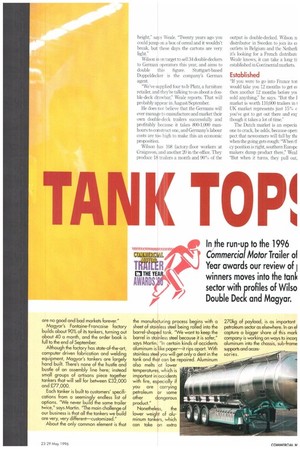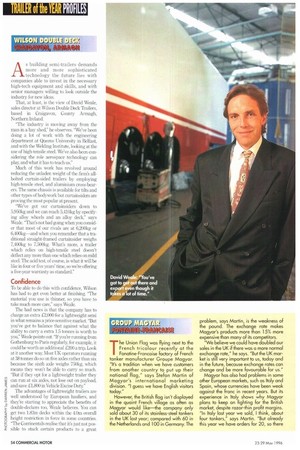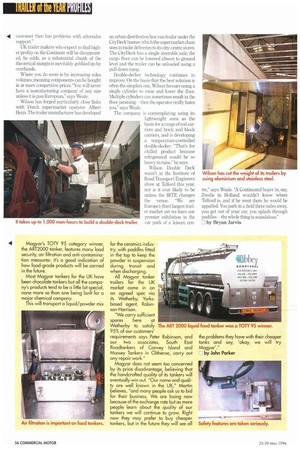TANK TOP!
Page 57

Page 56

Page 58

If you've noticed an error in this article please click here to report it so we can fix it.
In the run-up to the 1996 Commercial Motor Trailer ol Year awards our review of winners moves into the tank sector with profiles of Wilso Double Deck and Magyar. As building semi-trailers demands more and more sophisticated technology the future lies with companies able to invest in the necessary high-tech equipment and skills, and with senior managers willing to look outside the industry for new ideas.
That, at least, is the view of David Weale, sales director at Wilson Double Deck Trailers, based in Craigavon, County Armagh, Northern Ireland.
"The industry is moving away from the man in a hay shed," he observes. "We've been doing a lot of work with the engineering department at Queens University in Belfast, and with the Welding Institute, looking at the use of high-tensile steel. We've also been considering the role aerospace technology can play, and what it has to teach us."
Much of this work has revolved around reducing the unladen weight of the firm's allbolted curtain-sided trailers by employing high-tensile steel, and aluminium cross-bearers. The same chassis is available for tilts and other types of bodywork but curtainsiders are proving the most popular at present.
"We've got our curtainsiders down to 5,950kg and we can reach 5,410kg by specifying alloy wheels and an alloy deck," says Weale. "That's not bad going when you consider that most of our rivals are at 6,200kg or 6,400kg—and when you remember that a traditional straight-framed curtainsider weighs 7,400kg to 7,500kg. What's more, a trailer which relies on high-tensile steel doesn't deflect any more than one which relies on mild steel. The acid test, of course, is what it will be like in four or five years' time, so we're offering a five-year warranty as standard."
Confidence
To be able to do this with confidence, Wilson has had to get even better at finishing. "The material you use is thinner, so you have to take much more care," says Weale.
The bad news is that the company has to charge an extra £2,000 for a lightweight semi in what remains a price-sensitive market. "But you've got to balance that against what the ability to carry a extra 1.5 tonnes is worth to you," Weale points out. "If you're running from Gothenburg to Paris regularly, for example, it could be worth an additional £200 a trip. Look at it another way. Most UK operators running at 38 tonnes do so on five axls rather than six because the sixth axle weighs 750kg, which means they won't be able to carry so much. "But if they opt for a lightweight trailer they can run at six axles, not lose out on payload, and save £1,800 in Vehicle Excise Duty" The advantages of lightweight trailers are well understood by European hauliers, and they're starting to appreciate the benefits of double-deckers too, Weale believes. You can get two 1.83m decks within the 4.0m overall height restriction in force in some countries. "The Continentals realise that it's just not possible to stack certain products to a great height." says Weale. "Twenty years ago you could jump on a box of cereal and it wouldn't break, but these days the cartons are very light."
Wilson is on target to sell 34 double-deckers to German operators this year, and aims to double this figure. Stuttgart-based Doppeldecker is the company's German agent.
"We've supplied four to Ir Matz, a furniture retailer, and they're talking to us about a double-deck drawbar," Weak reports. That will probably appear in August/September.
He does not believe that the Germans will ever manage to manufacture and market their own double-deck trailers successfully and profitably because it takes 800-1,000 manhours to construct one, and Germany's labour costs are too high to make this an economic proposition.
Wilson has 108 factory-floor workers at Craigavon. and another 20 in the office. They produce 18 trailers a month and 9()% of the
output is double-decked. Wilson n distributor in Sweden to join its et outlets in Belgium and the NetherL it's looking for a French distribuu Weale knows, it can take a long ti established in Continental markets.
Established If you were to go into France ton would take you 12 months to get e:4 then another 12 months before yot sold anything," he says. "But the I market is worth 110,000 trailers in I UK market represents just 15% c you've got to get out there and exr though it takes a lot of time."
The Dutch market is an especia one to crack. he adds, because open pect that newcomers will fall by the when the going gets mugh: "When ti cy position is right, southern Europe makers dump product there," Weal "But when it turns, they pull out, customer then has problems with aftersales support."
UK trailer makers who expect to find higher profits on the Continent will be disappointed, he adds, as a substantial chunk of the theoretical margin is inevitably gobbled up by overheads.
Where you do score is by increasing sales volumes, meaning components can be bought in at more competitive prices "You will never have a manufacturing company of any size unless it is pan-European," says Weale.
Wilson has forged particularly close links with Dutch supermarket operator Albert Heijn. The trailer manufacturer has developed an urban distribution box van trailer under the CityDeck banner which the supermarket chain uses to make deliveries to its city-centre stores. The CityDeck has a single steerable axle; the cargo floor can be lowered almost to ground level and the trailer can be unloaded using a pull-down ramp.
Double-decker technology continues to improve. On the basis that the best solution is often the simplest one, Wilson favours using a single cylinder to raise and lower the floor. Multiple cylinders can sometimes result in the floor jamming-then the operator really hates you," says Weale.
The company is contemplating using its lightweight semi as the basis for a range of coil carriers and brick and block carriers, and is developing a temperature-controlled double-decker. "That's for chilled product because refrigerated would be so heavy to raise," he says.
Wilson Double Deck wasn't at the Institute of Road Transport Engineers show at Telford this year, nor is it ever likely to be unless the IRTE changes the venue. "We are Europe's third largest trailer market yet we have our premier exhibition in the car park of a leisure cen
tre," says Weale. "A Continental buyer in, say, Zwolle in Holland wouldn't know where Telford is, and if he went there he would be appalled. You park in a field three miles away, you get out of your cur, you splash through puddles -the whole thing is scandalous"
by Bryan Jarvis
The Union Flag was flying next to the French tricolour recently at the Fonatine-Francaise factory of French tanker manufacturer Groupe Magyar. "It's a tradition when we have customers from another country to put up their national flag," says Stefan Martin of Magyar's international marketing division. "I guess we have English visitors today." However, the British flag isn't displayed in the quaint French village as often as Magyar would like—the company only sold about 30 of its stainless-steel tankers in the UK last year; compared with 60 in the Netherlands and 100 in Germany. The
problem, says Martin, is the weakness of the pound. The exchange rate makes Magyar's products more than 15% more expensive than many of its competitors.
"We believe we could have doubled our sales in the UK if there was a more normal exchange rate," he says. "But the UK market is still very important to us, today and in the future, because exchange rates can change and be more favourable for us."
Magyar has also had problems in some other European markets, such as Italy and Spain, whose currencies have been weak against the franc in recent years. But its experience in Italy shows why Magyar plans to keep on fighting for the British market, despite razor-thin profit margins. "In Italy last year we sold, I think, about four tankers," says Martin. "But already this year we have orders for 20, so there are no good and bad markets forever."
Magyar's Fontaine-Francaise factory builds about 90% of its tankers, turning out about 40 a month, and the order book is full to the end of September. Although the factory has state-of-the-art, computer driven fabrication and welding equipment, Magyar's tankers are largely hand built. There's none of the hustle and bustle of an assembly line here; instead small groups of artisans piece together tankers that will sell for between £32,000 and £77,000.
Each tanker is built to customers' specifications from a seemingly endless list of options. "We never build the same trailer twice,' says Martin. "The main challenge of our business is that all the tankers we build are very, very different—customized."
About the only common element is that
the manufacturing process begins with a sheet of stainless steel being rolled into the barrel-shaped tank. "We want to keep the barrel in stainless steel because it is safer," says Martin. '`Ir certain kinds of accidents aluminum is like paper—it rips apart. With stainless steel you will get only a dent in the tank and that can be repaired. Aluminum also melts at lower temperatures, which is important in accidents with fire, especially if you are carrying petroleum or some
other dangerous product," Nonetheless, the lower weight cf aluminum tankers, which can take an extra 270kg of payload, is as important petroleum sector as elsewhere. In an el capture a bigger share of this mark company is working on ways to incorf aluminum into the chassis, sub-frame supports and accessories.
Magyar's TOP( 95 category winner, the ART2000 tanker, features many load security, air filtration and anti-contamination measures: it's a good indication of how food-grade products will be carried in the future.
Most Magyar tankers for the UK have been chocolate tankers but all the company's products tend to be a little bit special, none more so than one being built for a major chemical company. This will transport a liquid/powder mix for the ceramics industry, with paddles fitted in the top to keep the powder in suspension during transit and when discharging.
All Magyar tanker trailers for the UK market come in on an agreed spec via its Wetherby, Yorksbased agent, Robinson-Harrison.
"We carry sufficient
spares here at Wetherby to satisfy 95% of our customers' requirements says Peter Robinson, our two associates, South Roadtankers of Canvey Island Massey Tankers in Clitheroe, carry out any repair work" Magyar does not seem too concerned by its price disadvantage, believing that the handcrafted quality of its tankers will eventually win out. "Our name and quality are well known in the UK," Martin believes, "and many people ask us to bid for their business. We are losing now because of the exchange rate but as more people learn about the quality of our tankers we will continue to grow. Right now they may prefer to buy cheaper tankers, but in the future they will see all
and East and
the [Problems they have with their cheaper tanks and say, 'okay, we will try Magyar'."
by John Parker




















































































































